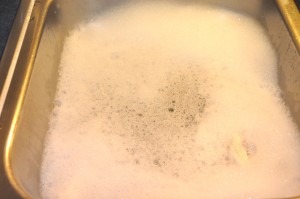 Recently, Paul and I took the opportunity to be kitchen crew for two nights at Camp Matz, Watertown, Wis., a ministry of Bethesda Lutheran Communities.
Recently, Paul and I took the opportunity to be kitchen crew for two nights at Camp Matz, Watertown, Wis., a ministry of Bethesda Lutheran Communities.
It was a week without the usual cadre of kitchen volunteers, so a call went out to Bethesda employees to come and help. We set up for dinner, served the meal, and did the dishes.
Paul did the first wash with the power sprayer. I staffed the wash, rinse and sanitize sinks and put the dishes in the dishwasher tray. My next-office colleague and her daughter loaded the tray in the industrial dishwasher and put the dishes away.
Spray. Wash. Rinse. Sanitize. Load. Unload. Repeat.
I began to reminisce about service dish-washing.
When I was around 13 years old, I helped my mom and other women do the dishes after a congregation dinner. Sometime later, mom came home with a gift for me. One of the women doing dishes that night gave me a cookbook for helping out. What an amazing, unexpected, grown-up affirmation. The raisin sauce I serve with ham is a lasting recipe from that cookbook.
During her two years of confirmation preparation, daughter Annie (now Pastor Annie) was expected to do service in the congregation and in the community. At that time, Sunday mornings often found the three of us in three different places in one church building. I decided we should all join the Altar Guild—Annie would earn abundant service points and the Edison-Swift family would spend more Sunday morning time together.
What a good decision.
We learned how to set the table for the Lord’s Supper: chalice, purifier, paten, little glass cups set in trays and filled with wine and one ring of grape juice. We learned the colors of the liturgical seasons and when to bring out the gold instead of the usual silver. We learned how to handle respectfully the blessed wine and bread. We wore gloves to carry the brass vases. To get the bouquets ready for home visitors to distribute, we removed the flowers from the vases and placed them in coffee cans covered with green tinfoil.
In the process of washing and drying the dishes, Annie claimed C. as an honorary grandma, beginning a long-lasting relationship. We three Edison-Swifts were often on Altar Guild duty with C. and L., a woman with an intellectual disability. L. was fond of correcting and directing Annie. We talked over the situation as a family and surmised an often-corrected adult might be inclined to over-correct a child. In was a lesson in empathy for all of us.
When you show up to do the dishes, people are happy to see you. We found accepting and welcoming community in the sacristy after the 11 a.m. service.
Of course, dish washing is best when it is volunteered service, not expected service.
In my mom’s day, women’s circles were expected to do the congregational dishes. Those days are over and that is a good thing. Instead of coed service dish-washing, though, many congregations have moved to disposable dishes for potlucks and coffee hours. Maybe that is not such a good thing.
Thirty years ago, Mom belonged to a congregation equipped with an industrial dishwasher, akin to what we used at Camp Matz. The retired men in the congregation decided that it took a man to operate heavy machinery, so they took over washing the cups and glasses after coffee hour. “We (the women) just smiled, thanked them for their service, and got out of the way,” Mom said with a wink.
Spray. Wash. Rinse. Sanitize. Load. Unload. Repeat.
Soli Deo Gloria.
Sue Edison-Swift
Aug. 16, 2013
